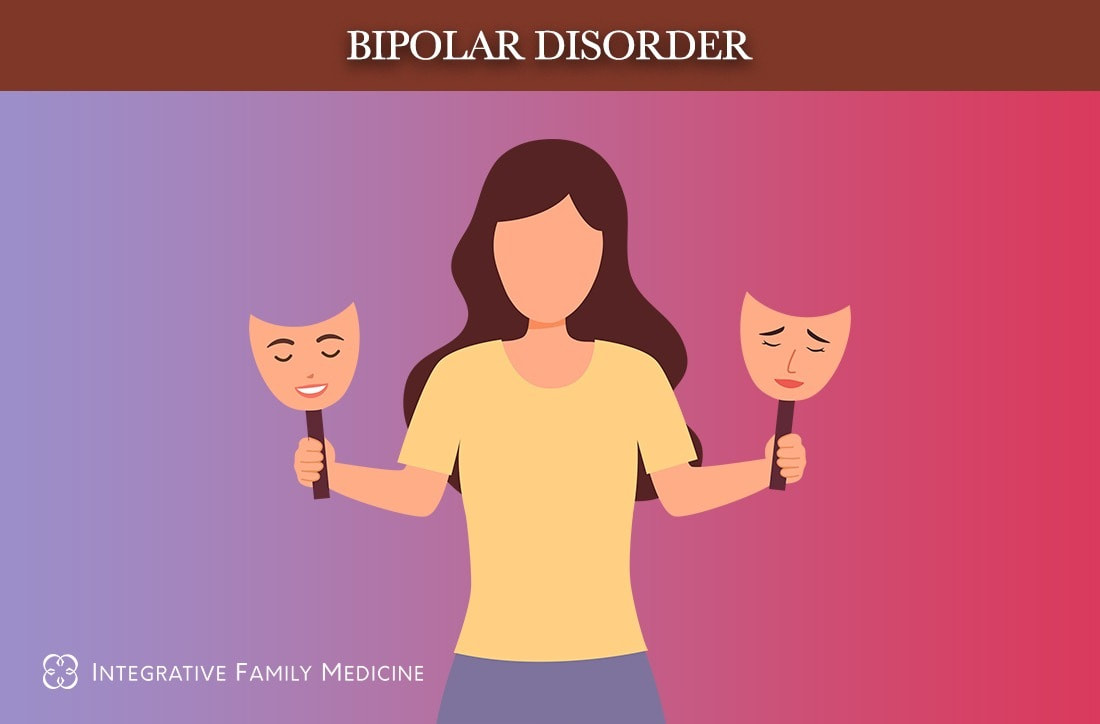|
Read Part 1 here: (https://www.integrativemediowa.com/blog/mental-health-common-forms-of-mental-distress-part-1) Bipolar Disorder is a mood disorder, formerly referred to as manic depression. It can be characterized by extreme mood swings of emotional highs (mania/hypomania) and lows (depression). A mood swing episode can occur only rarely for some, while others may experience an episode multiple times per year. Symptoms may cause unpredictable changes in behavior and mood, often resulting in significant distress and difficulty in daily life. It is important to know that symptoms of Bipolar Disorder can vary from person to person, as well as over time, and because of this, there are several types of bipolar disorder. Regardless of the type, bipolar disorder is most commonly treated with medication and psychotherapy. Possible symptoms of a manic/hypomanic episode may include euphoria, unusual talkativeness, decreased need for sleep, racing thoughts, distractibility, increased energy, or poor decision making. Possible indications of a depressive episode include loss of interest in daily activities, low energy/fatigue, feelings of worthlessness, sleep dysfunction, trouble concentrating or thoughts of suicide. Both depressive and manic/hypomanic episodes can improve with treatment and our holistic treatment plan could include strategies aimed at lifestyle, body, mind and spirituality in order to treat the root cause behind the distressing symptoms. We will form a personalized plan with the goal of creating a balanced mood and life. By Justin, DNP, ARNP, PMHNP-BC
3 Comments
9/17/2023 05:41:07 am
Incredible insights on Bipolar Disorder and its varied symptoms and treatment approaches. It's crucial to acknowledge the individuality of this condition and work towards holistic well-being. Thank you, Justin, for shedding light on this complex issue.
Reply
1/23/2024 07:12:33 am
This was such an enlightening read on bipolar disorder. I never fully understood how broad the spectrum of bipolar symptoms could be or how important it is to have an accurate diagnosis. Thank you for providing a comprehensive overview of the various types of bipolar disorder and practical tips for managing different phases of the illness. Articles like this are so valuable for increasing awareness and reducing stigma around mental health conditions.
Reply
2/5/2024 03:51:11 pm
This blog post provides a succinct yet comprehensive overview of Bipolar Disorder, shedding light on its complexity and the breadth of its manifestations.
Reply
Your comment will be posted after it is approved.
Leave a Reply. |
Blog Info
Archives
June 2024
Categories
All
|
|
Visit our Locations
IFM | West Des Moines 475 S. 50th St., Suite 600 West Des Moines, IA, 50265 *Temporarily Closed* IFM | Ankeny 207 NE Delaware Ave. Suite 20 Ankeny, IA 50021 |
Office HoursMonday 9:00 a.m. - 5:00 p.m. Tuesday 9:00 a.m. - 5:00 p.m. Wednesday 9:00 a.m. - 5:00 p.m. Thursday 9:00 a.m. - 5:00 p.m. Friday by appointment. Sat & Sun Closed |
© 2024 Integrative Family Medicine of Iowa, PLLC.
All rights reserved.
All rights reserved.



 RSS Feed
RSS Feed

